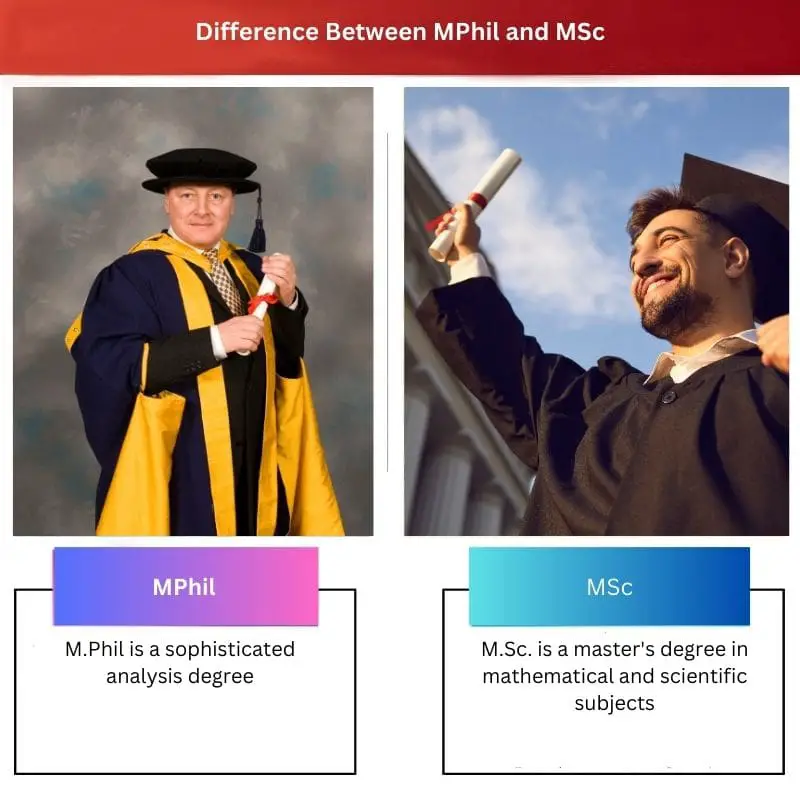MPhil (Master of Philosophy) typically involves more independent research, culminating in a thesis. It’s often a precursor to a Ph.D., emphasizing advanced research skills. MSc (Master of Science) focuses on coursework and a final project, providing a broader and structured curriculum in a specific field.
Key Takeaways
- An MPhil (Master of Philosophy) is an advanced postgraduate research degree that requires the completion of a thesis based on original research.
- An MSc (Master of Science) is a postgraduate degree focused on a specific scientific or technical field involving coursework and, in some cases, a research project or dissertation.
- The primary difference between the two is the emphasis on research: an MPhil degree has a strong research component. In contrast, an MSc degree focuses on advanced coursework and may or may not involve a research project.
MPhil vs MSc
The difference between M.Phil and M.Sc is that M.Phil focuses more on research-based education with sound analytical knowledge, as a scholar must carry out their research project in a specialized field. M.Sc entirely relies on classroom teaching, seminars, and a few practical work.

Comparison Table
| Feature | MPhil | MSc |
|---|---|---|
| Focus | Research-oriented | Coursework-oriented with potential research component |
| Depth of Study | Deeper specialization on a specific research question | Broader knowledge across a subject area |
| Length | Typically 2 years full-time | Typically 1 year full-time |
| Thesis | Mandatory, significant research project | Optional or shorter research component |
| Career Path | Prepares for PhD, research-based professions | Advanced professional roles, further study (including PhD) |
| Subject Availability | Offered in most fields | More common in STEM (Science, Technology, Engineering, Mathematics) |
What is MPhil?
Admission Requirements
- Educational Background: Typically, candidates for MPhil programs hold a bachelor’s degree in a relevant field. Some programs may also require a master’s degree or equivalent.
- Academic Performance: Admission is competitive, and universities often consider the candidate’s academic record, including grades and relevant coursework.
- Research Proposal: Applicants are usually required to submit a research proposal outlining their intended area of study and research objectives.
Program Duration
The duration of MPhil programs varies, but they generally take one to two years to complete. The first part of the program typically involves coursework to build research skills, while the latter part is dedicated to independent research leading to a thesis or dissertation.
Course Structure
- Research Methodology: MPhil programs often include coursework in research methods, helping students develop the skills necessary for conducting independent research.
- Specialized Courses: Depending on the field of study, students may take specialized courses to deepen their understanding of the subject matter.
Research Component
- Thesis/Dissertation: The hallmark of an MPhil program is the completion of a substantial research project. This culminates in the production of a thesis or dissertation that contributes to the existing body of knowledge in the chosen field.
- Supervision: Candidates typically work closely with a supervisor or advisory committee throughout the research process.
Assessment and Evaluation
- Coursework Assessment: The coursework component is often assessed through examinations, assignments, and projects.
- Thesis Defense: The final assessment involves defending the research thesis before an examination panel. This oral examination allows candidates to demonstrate their understanding of the research and defend their findings.
Career Opportunities
- Academic Careers: Many MPhil graduates choose to pursue further academic qualifications or academic careers, working as professors, researchers, or lecturers.
- Research Positions: MPhil graduates are well-equipped for roles in research institutions, think tanks, and organizations requiring strong research skills.
- Industry Roles: Some industries value the research and analytical skills developed during an MPhil program, making graduates suitable for roles in policy analysis, consulting, and specialized fields.

What is MSc?
Eligibility Criteria
Educational Background
To pursue an MSc, candidates typically need a relevant bachelor’s degree in the field of study. The specific academic requirements may vary based on the program and institution.
Entrance Exams
Some MSc programs may require candidates to take standardized entrance exams, such as the GRE (Graduate Record Examination) or GMAT (Graduate Management Admission Test), depending on the program’s focus.
Duration and Structure
Duration
The duration of an MSc program varies, but it generally takes one to two years of full-time study to complete. Part-time options may be available for those balancing work and academics.
Course Structure
MSc programs often consist of a combination of coursework, research, and a thesis or dissertation. The coursework provides a solid foundation in the chosen field, while the research component allows students to delve into specific topics of interest.
Specializations
Diverse Fields
MSc programs are available in a wide range of disciplines, including but not limited to science, technology, engineering, mathematics, business, social sciences, and humanities. Students can choose a specialization based on their career goals and interests.
Interdisciplinary Options
Some MSc programs offer interdisciplinary study options, allowing students to combine knowledge from multiple fields to address complex challenges.
Career Opportunities
Academic Positions
An MSc degree is often a prerequisite for pursuing a Ph.D. and entering academia as a researcher or professor.
Industry Roles
MSc graduates are sought after in various industries, where they can apply their specialized knowledge and skills in roles such as research and development, data analysis, project management, and consulting.
Advantages of Pursuing an MSc
In-Depth Knowledge
MSc programs provide a deep understanding of a specific subject, fostering expertise that can lead to advanced career opportunities.
Research Opportunities
The research component of MSc programs allows students to contribute to the advancement of knowledge in their field through original research projects.

Main Differences Between MPhil and MSc
- Degree Focus:
- MPhil is a research-oriented degree that emphasizes independent research and the production of a thesis or dissertation.
- MSc is a more coursework-based degree, focusing on theoretical and practical knowledge in a specific field.
- Research Component:
- MPhil programs typically require a substantial research project and the completion of a thesis, demonstrating original contributions to the field.
- MSc programs may include a research component, but the emphasis is often on coursework, exams, and practical applications of knowledge.
- Duration:
- MPhil programs are usually longer in duration, often taking two years or more to complete.
- MSc programs are typically shorter, often lasting one to two years.
- Entry Requirements:
- MPhil programs may require a stronger emphasis on research skills and may be suitable for those with a background in research or a related field.
- MSc programs may be more accessible to students with a broader range of undergraduate backgrounds, as they often include foundational coursework.
- Career Orientation:
- MPhil programs are often seen as a pathway to further research, such as pursuing a Ph.D., and are suitable for those interested in an academic or research-oriented career.
- MSc programs are designed to prepare students for professional careers in various industries, with a focus on applying theoretical knowledge to real-world problems.
- Assessment Methods:
- MPhil assessment is heavily based on the research thesis, which is rigorously evaluated for its contribution to the field.
- MSc assessment involves a combination of exams, coursework, and sometimes a smaller research project or dissertation.
- Degree Titles:
- The title “MPhil” reflects the emphasis on philosophy and original research in the degree.
- The title “MSc” reflects the focus on scientific and systematic knowledge within the degree.






